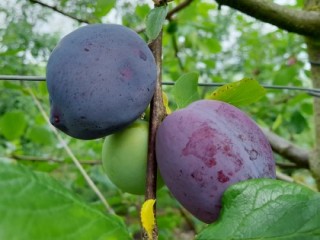
The Niab Plum Demonstration Centre (PDC) is a centre of excellence for tree fruit growers to show best practice, the latest practical research and to implement new technology.
The Centre has evolved from a planting of plum trees at East Malling, established for demonstration purposes as part of an Innovate UK project involving Niab between 2015 and 2019. The project focused on enhancing yields, reliability of cropping, extending the production season from July to October, and improving fruit value by raising the quality of the fruit being marketed and consumed.
The results of the project are now available in a Plum Best Practice Guide.
The first trees were established at the PDC at East Malling in 2016 to assess a range of rootstocks and to compare different rootstock/training system combinations.
Several other new plum orchards were established on commercial sites in Kent following the completion of the Innovate UK project, specifically to showcase a range of new plum varieties.
Between 2019 and 2022, the Plum Demonstration Centre was funded by the Agriculture and Horticulture Development Board (AHDB), when it evolved and expanded to include covered areas of plums, an area demonstrating 23 new varieties and additional demonstrations which implemented the results of AHDB and other funded tree fruit research projects.
New funding and aspirations from 2022
With new funding secured, a consortium was developed to fund the maintenance of the Centre and steer the activities considered most beneficial to UK plum growers.
The Centre is now financially supported by the following companies and grower-owned businesses:
| AC Hulme & Sons | J Myatt & Co |
| Bardsley-England | Norton Folgate (Marketing) Ltd |
| Berry Gardens | Primafruit Ltd |
| Castle Fruit Farm | SW Highwood (Pluckley) Ltd |
| DPS Ltd | Torry Hill Farms |
| FP Matthews | WB Chambers |
| Gaskains Ltd | Worshipful Company of Fruiterers |
| GH Dean |
The consortium agreed that the work programme for 2022 should focus on creating more balanced tree growth in the orchard and developing a precision irrigation/fertigation system to demonstrate best practice in plum orchard nutrition.
Niab has installed soil matric potential sensors at 15cm, 30cm and 45cm depth and a volumetric moisture content sensor at 45cm under representative trees. Irrigation (and fertigation) will be triggered at an average soil matric potential value of -60 KPa. This irrigation threshold will be lowered throughout the season to a value of -100 KPa.
A bespoke fertigation programme devised for plums by Yara will be applied to all established trees. Yara are also devising a fertiliser programme for newly planted trees, scheduling fertigation little and often to help the trees establish.
Further research and demonstration
Niab will work with the new consortium to agree on additional research and demonstration projects considered to be of highest priority for the industry.
Ongoing research
Rootstock comparisons
The performance of Victoria is being compared on four rootstocks (four replicated 5-tree plots) of varying vigour including VVA1, Wageningen, Wavit and St. Julian A. The planting allows replicated comparisons of the performance of Victoria including tree size/vigour, flowering time, ripening time/season, disease susceptibility, productivity and fruit size and quality.
Training system comparisons
The performance of Victoria is being compared on different training system/rootstock combinations (Narrow table-top, Narrow A frame, Oblique spindle and Super spindle on rootstocks VVA1, Pixy, Wavit and St. Julian A) and two single rows of Victoria are also being compared on Fan and Candelabra systems.
Variety comparison
In 2020, 23 new selections and varieties were planted in a dedicated variety trial plot to gather yield and quality data from a range of varieties that will extend the season from the start of July until the end of September. This includes varieties in the table which are compared to Victoria as the standard.
| Variety | Cropping season | Variety | Cropping season |
| Herman | Early July | Top Five | Late August |
| Katinka | Mid-July | Victoria | Late August |
| P7-38 | Mid-July | Haroma | Early September |
| Juna | Mid-July | Seneca | Early September |
| Meritare | Late July | Marjory | Early September |
| P6-19 | Late July | Top Taste | Mid-September |
| Opal | Early August | Coe’s Golden Drop | Mid-September |
| Lancelot | Mid-August | Laxton’s Delicious | Mid-September |
| Avalon | Mid-August | Top Hit | Mid-September |
| Julieum (Jubilee) | Mid-August | Haganta | Late September |
| Reeves | Mid-August | Top End | Late September |
| Ferbleue | Late August |
